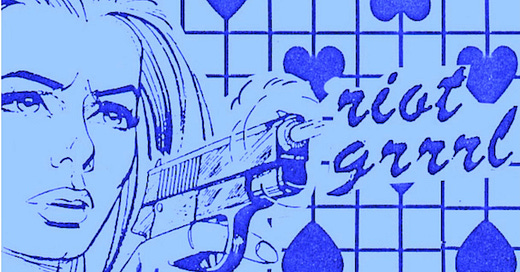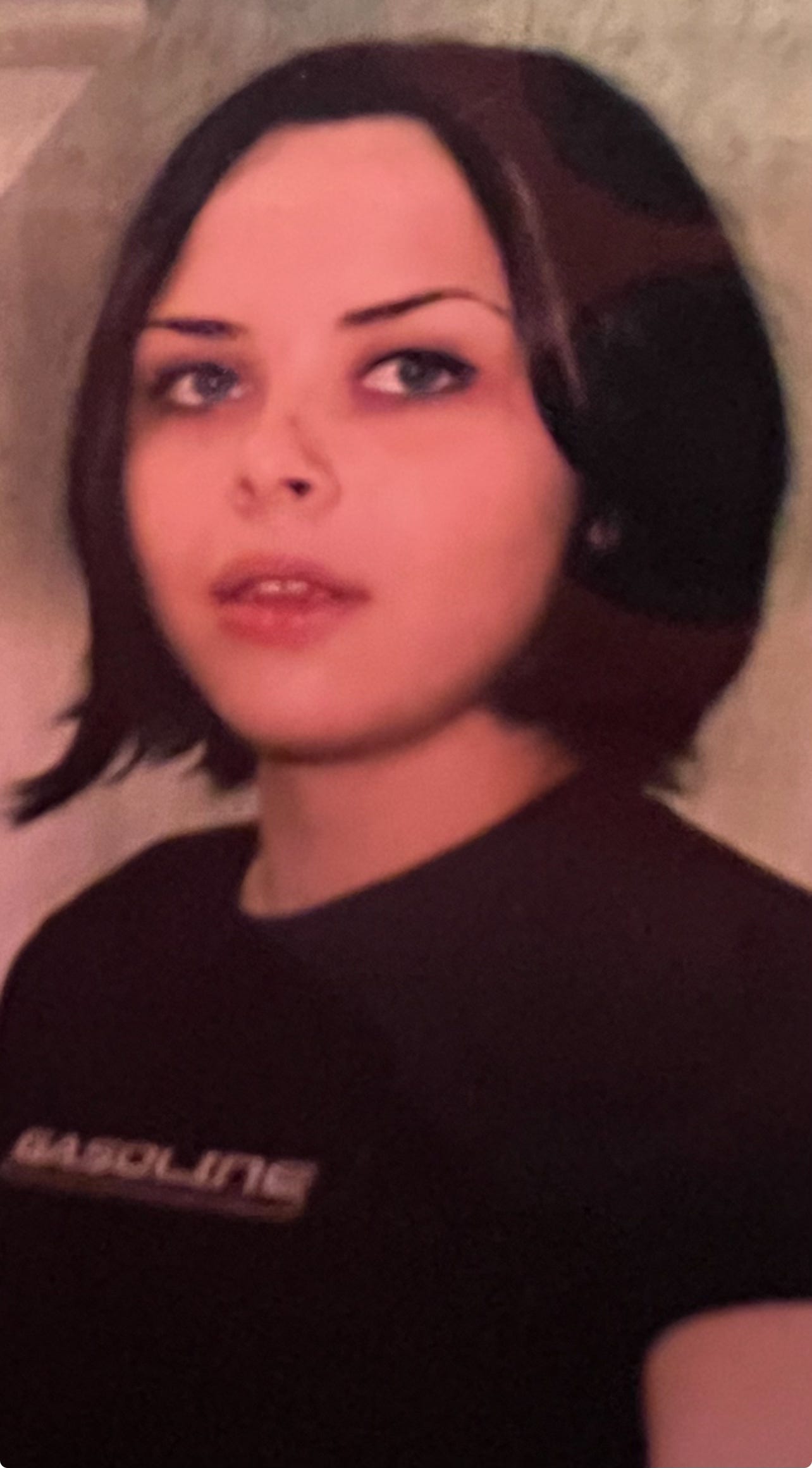Riot grrrl feminism, “estrogen terrorists,” and what I wish I had learned about men and women when I was growing up
At my high school in rural BC, all the older girls I looked up to had carved or penned “RIOT GRRRL” onto their class binders. Almost all of the same girls had box-dyed their hair black and wore black makeup and band T-shirts. I wanted to be like them.
Between my first and second years of high school, I went from bleaching my hair into a brassy blonde (ugh) to the same garish jet-black of the punk girls. I nervously added the black makeup and band T-shirts as the school year progressed, hoping I’d be offered grace—or at least be completely ignored—as I overhauled my identity from preppy to punk. “Preppy” had been a brief, uncomfortable intermediary between “tomboy” and what I felt was my true self: the dark, angsty, angry punk girl. My first boyfriend played football; later that year I had an older, punk boyfriend who played guitar. I felt like I had made it.
Because these formative years were in the Pacific Northwest (PNW), being “punk” (and being a girl) meant that I was exposed to riot grrrl feminism. The riot grrrl movement started in the 90s as an amalgamation of punk, grunge, and third-wave feminism—specific to the PNW. I didn’t really know anything about third-wave feminism, but I did find the angsty music had exactly the dark emotional valence I was looking for. I also didn’t much care about feminism or political messages: I just wanted a tribe to belong to. And while I didn’t think that I was absorbing lessons on third wave feminism, it turns out I was.
I’d summarize the ideas I internalized from third-wave feminism/riot grrrls as these:
Men and women should be equal but are not. Women have to fight for equality. Men and women are only different because of socialization and gender stereotypes. Equality between the sexes means we can and should do the exact same things, exactly as well as one another. If women aren’t doing those things, it’s from sexism. If women aren’t doing them as well, that’s likely also sexism at play.
What I wish I had learned instead is this:
Men and women are different and have (with exceptions of course) different talents and abilities. The differences between the sexes are driven largely by “survival of the fittest,” as described by evolutionary psychologists. Women don’t need to be the same as men to be equal to them. Females have unique and valuable strengths and traits. And, perhaps most importantly, males have a distinct sexual drive and tendency towards violence.
Even though I took biology class and learned the differences in male bone structure, musculature, lung capacity, and overall size, the internalized feminist ideas in my brain overpowered the plain reality on the pages of my textbook: I thought that women should work harder, get stronger, and perform as well as males at physical tasks. I certainly believed that females of the same height and weight as males should be just as strong. I thought that being the smaller, weaker sex was intolerable.
I felt bitter that my brother was a good skateboarder while I couldn’t figure out how to do a kickflip. I was bitter that the boys always won in track and field. The only sport I could semi keep up with the boys at was hockey—since I’d spent years in Edmonton playing rollerblade hockey in summers and ice hockey in winters before moving to BC. I realized that in hockey, I at least had enough skill to match the boy’s amateur level. But rather than feeling proud, this made me bitter, too.
(If this all sounds familiar, you might be thinking of how some grown ass women—third-wave feminist ones—to this day will tell female athletes to just work harder when they’re being forced to compete against males who’ve identified their way into their sports.)
And then there’s male sexuality and male violence. Starting around age 14, I began to receive a landslide of male attention from boys my age and much older men. I had zero understanding of male sexuality and naively believed that the sudden interest had to do with how mature, sophisticated, and cool I was (what a riot). I can’t count the number of times this left my ego bruised when I figured out that none of these males gave a damn about my thoughts or opinions. Nor can I count the number of times I put myself in danger—quite seriously, on a few occasions—because of my naivety about males.
Take the time when I was walking home from a movie with my girlfriend, both of us 14, and we stopped at an empty restaurant to use the bathroom. The 50-something male owner offered me a shot of vodka—wow, he must think I am so mature, I told myself—and then, after drinking it (and while my friend was in the toilet) he said point blank “Now you have to show me your tits.” I didn’t, but I did leave the restaurant thinking that this was an aberration or extreme outlier in terms of male behaviour. It didn’t even strike me as male behaviour in the slightest. What a freak, I told myself.
Another time, I foolishly believed two older jocks who claimed they wanted me to bring my friends to a party at a church basement they had a key for. I thought that I would gain tremendous social clout for securing this type of party. The boys said to meet them there after school and that they’d give me the key and we’d plan for the weekend. As it happened, they didn’t give me a key. But I did sit nervously in the basement while they whispered to one another in a side room for several minutes before I finally left. Years later, I heard that one of those males had been charged with rape.
I really had no idea to be weary of older males. Yes, I’d heard of “the patriarchy” but, as I mentioned, I wasn’t into the riot grrrl scene to learn, and the idea of being angry towards men, as far as I was concerned, was limited to my bitterness about their physical strength and the way that they seemed to be the main characters in every high school clique. The dudes were punk, but the girls were “punk chicks”—like we had to work twice as hard to achieve their level of authenticity. That fight, to me, defined feminism. It was purely about trying to be as good as the males, and never about appreciating women’s talents, biology, and differences.
Riot grrrl feminism, and by extension, third-wave feminism, is a brain blight that pits males and females against one another. It ironically promotes the sexist idea that the female fight for equality is about women needing to be the same as men if they want to have the same worth as men. As one academic (I use that term loosely) described it, riot grrrl was about “colonizing the ‘traditionally’ male territory of anger.” Do women not have their own anger? Must we instead strive to be angry like men? If we must strive to be them, or at least as strong as them, then why should we heed our self-preservation instinct—that entirely rational pit in our stomachs—in situations when we should be wary of sexual assault or violence?
It wasn’t my experience that the riot grrrl movement told us that us females had any value. Instead, its focus was on expressing a masculine rage and attacking femininity. Rather than feeling empowered by its messages, I felt bitter and lesser than. Nor did I learn how to keep myself safe from males. And how could I, when being afraid of males felt like a weakness and a failing?
Unfortunately, I missed it when Courtney Love called the riot grrrl feminists a “little pack of estrogen terrorists” and “estrogen lemmings”—descriptors I can now get behind. No movement that rejects the truth and reality about its own members can be empowering. All the things I wish I’d known…
***
Thank you for reading! As always, I hope you will consider a paid subscription here.
xo
Amy






" I had zero understanding of male sexuality and naively believed that the sudden interest had to do with how mature, sophisticated, and cool I was" I vividly remember thinking that at that age.
Maybe Smart Grrrl Feminism has finally come of age. I am of a different, older generation. Every generation has to navigate these same waters. That probably comes from not listening to our elders, or not asking the right questions of them. Being a man, I can tell you that when it comes to being a dumb teenager, both sexes are on equal footing. I thank God I had a father who would have kicked my butt up between my shoulders had I been the cause of any of the stunts that you had to experience as a young girl.
Those who hold the guiding reins of culture must carry the bulk of the blame for these bad experiences, and for why they may be getting worse. These powerful people were once held to a code of ethics, but the chic movements of the day, and ever increasing amoral philosophies have won out over ethics and morality.
A brave and nicely written essay. Thanks for sharing.